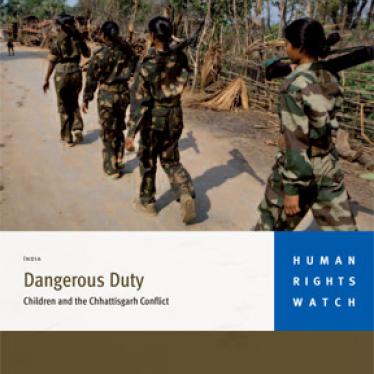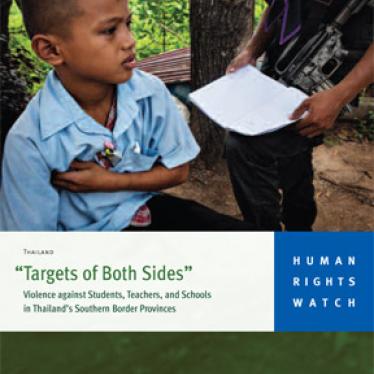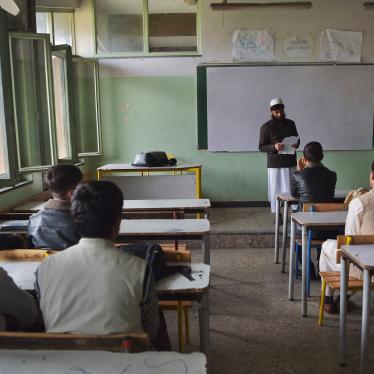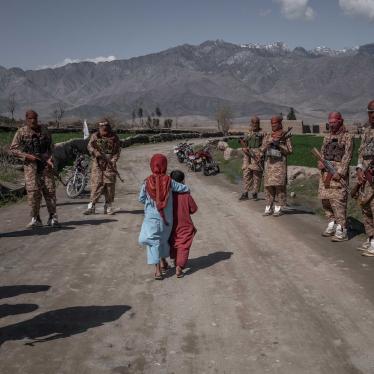All parties implicated in a new United Nations’ report about abuses of children during armed conflict should call an immediate halt to these crimes, Human Rights Watch said today. The UN secretary-general’s annual report on children in armed conflict was released on July 1, 2014.
The report lists parties to armed conflict that are documented to have committed serious violations of international humanitarian law against children. These include recruiting and using children in their operations, killing and maiming children, sexual violence against children, or attacks on schools or hospitals. Human Rights Watch cited inconsistencies in the UN monitoring and reporting, however, which may reduce the report’s effectiveness.
“All groups on the secretary-generals’ list of shame for their serious violations against innocent children deserve the world’s contempt,” said Bede Sheppard, deputy children’s rights director at Human Rights Watch. “All parties named in the UN report need to work with the UN to put a stop to abuses against children and to protect them from harm.”
Once a party to an armed conflict is placed on this list, it triggers increased response from the UN, including intensified engagement by UN agencies in the affected country and potential Security Council sanctions. Such sanctions can include arms embargoes, travel bans, asset freezes, and referrals to the International Criminal Court against the officials responsible for violations. For government armed forces or non-state armed groups to be removed from the list, the UN must verify that parties have ended the abuses, primarily with time-bound action plans.
This year’s report added eight new parties to the list of abusers, including Boko Haram in Nigeria for systematic attacks on schools and killing and maiming of children. The Chadian Armed Forces was removed from the list after the UN determined that it had fully complied with its action plan, documented no new cases of recruitment of children, and found no children during monitoring of armed forces activities.
Although certain groups were mentioned in the text of the report, they were not formally added to the list. The report notes, for example, that Maoist forces in India and the Barisan Revolusi Nasional-Coordinate (BRN-C; National Revolutionary Front) in southern Thailand continue to recruit and use children, yet neither group was added to the list that could trigger UN action against them. Similarly, the report documents attacks on schools by the Tehrik-i-Taliban in Pakistan, by the Maoists in India, and al-Hirak separatists in Yemen without adding them to the list.
Taliban forces make the list for their attacks on schools and teachers in Afghanistan, but not for similar attacks in Pakistan.
Parties that have been included in the list for five years are labeled “persistent perpetrators,” leading to extra scrutiny and increasingly targeted measures by the UN. Yet the Maoist armed group in India, also known as the Naxalites, which has been featured in the text for the UN reports for five years, has never been added to the list.
Although Maoist attacks on schools have decreased in recent years, the secretary-general’s report clearly shows that the attacks persist, and that the group qualifies under Security Council Resolution 1998 (2011) for inclusion in the list, Human Rights Watch said.
Although this is the first time that the secretary-general’s report has named the BRN-C for violations in southern Thailand, the secretary-general first reported on the recruitment and use of children by unspecified “armed groups” in 2010, and has referenced attacks on schools in the area by “armed elements” since 2007. Human Rights Watch has documented that the BRN-C was responsible for recruiting children and attacks on schools since 2007.
“Child soldiers and schools in India, Pakistan, and Thailand deserve the same protection from the United Nations as children suffering from other conflicts,” Sheppard said. “Unless all groups are rebuked and punished for similar offenses, the credibility and impartiality of the UN process is threatened.”
The UN report reflected several improvements in its actions to address abuses of children during conflicts, including increased monitoring of attacks on schools, teachers, and hospitals.
There is also more information on the military use of schools, which endangers children and deprives them of their right to education. The UN documented such abuses in 15 conflict situations. The secretary-general encouraged all member countries to make it a priority to adopt concrete measures to deter the military use of schools. These measures should include incorporating into legislation or military doctrines protections proposed by the “Draft Lucens Guidelines for Protecting Schools and Universities from Military Use during Armed Conflict,” Human Rights Watch said.
“The secretary-general’s annual report is one of the most effective ways that the UN has to push for real improvements in the behavior of parties to armed conflict toward children,” Sheppard said. “It’s critically important for the UN to be unquestionably impartial as it reports on abuses against children during war and presses all parties to halt their abuses.”








